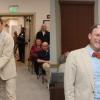Aug. 25 marked the first time in Delaware that healthcare providers and community leaders got together to talk about how climate change and pollution are harming the health of our neighbors. During a half-day webinar organized by the Delaware Academy of Medicine/Public Health Association and the Mid-Atlantic Alliance for Climate and Health, healthcare professionals, including nurses and physicians, met with community members to hear from both local and national experts about how healthcare contributes to pollution, how that pollution causes and worsens disease, and the proven ways we can do better.
The event was supported by Energize Delaware and Delaware Humanities. Delaware Interfaith Power and Light was instrumental in creating the themes of the meeting, and in identifying panelists. The Medical Society of Delaware provided advice and publicity. Speakers were from St. Francis Hospital, Nemours Children's Hospital, ChristianaCare Health System, Healthcare Without Harm, the National Academy of Medicine, the Medical Society Consortium on Climate and Health, Cooper University Hospital and My Green Doctor.
Several speakers reminded the participants that hospitals and medical offices account for more than 8% of the greenhouse gas emissions in the United States, and hospitals themselves use three times the energy per square foot than other commercial buildings. It was acknowledged that medical facilities are unique in many ways, but there is much that can be done to improve the carbon footprint. Many respiratory and heart conditions, including asthma, are worsened by greenhouse gases, and any improvement has an almost immediate benefit to health. In addition, those carbon emissions contribute to climate change and to worsening environmental risks in the longer term. To illustrate this point, Dr. James Fletcher from Dover told the story of growing up in Baltimore near a large trash incinerator and having severe asthma, which quickly improved when his family relocated to the Dover area.
The speakers from St. Francis, Nemours and Christiana Care, both physicians and administrators, described the plans their hospitals have begun, and are accelerating, to be part of the solution to climate change, and not part of the cause.
The session wrapped up with a panel on environmental justice as it relates to healthcare. Speakers from national and local organizations described the outsized impact climate change has on urban and lower-income communities, and on people of color. Historically refineries, incinerators, bus yards and coal power plants have been located in these communities, in which citizens have lacked the ability to influence those facilities. The result has been a disproportionate share of asthma and other respiratory diseases, problems with pregnancies, and even hospitalizations and deaths from COVID.
The webinar did generate a sense of optimism. The science is now clear, and most Americans agree that something needs to be done. And, the solutions are now available and affordable to our society. What's missing is the prioritization and will to act. This meeting was meant to bring folks together to focus on the actions. It is not too late. As our last speaker of the day, Dora Williams from the Delaware Concerned Residents for Environmental Justice, said, "There is hope!"
A recording of the webinar will be available on the Mid-Atlantic Alliance for Climate and Health website www.maach.org.






















































